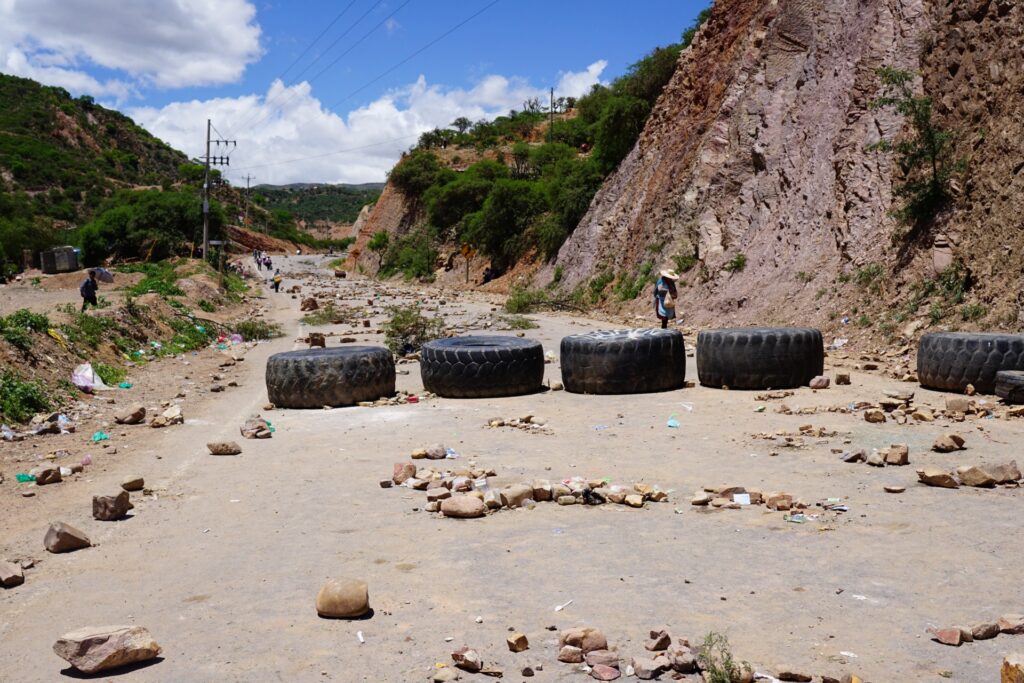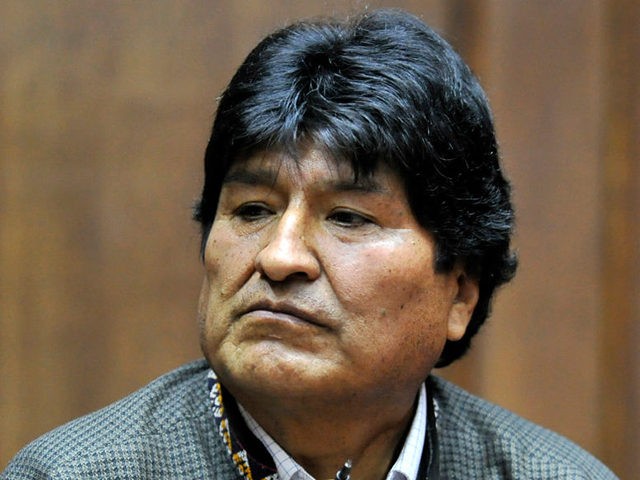Bolivia’s economy has suffered over $680 million in losses as a result of sympathizers of Bolivia’s socialist former President Evo Morales rioting for ten days and counting against the socialist government of Luis Arce, Morales’ “disowned” successor.
The ongoing protests mark a new chapter in the rift between Arce and Morales who, despite being ineligible to run for president, is attempting to once again rule Bolivia, ignoring the two-term limits that the nation’s constitution explicitly sets.
The rioters are demanding that the Bolivian government replace the members of its top court with new elections. The justices’ terms were extended beyond their expiration dates due to parliamentary disagreements in the ruling Movement Towards Socialism (MAS) party. The Bolivian constitution allows the nation’s electorate to choose its top-level court justices.
The protests erupted on January 22, weeks after the Bolivian Constitutional Court disqualified Morales from running for a fifth presidential term, reaffirming that the Bolivian constitution only allows a person to serve as president or vice-president of Bolivia for a maximum of two terms.

Coca farmers, supporters of Bolivian former President Evo Morales, hold a blockade on a highway that goes from La Paz to Cochabamba to demand the resignation of the judges who disqualified Morales’ candidacy for next year’s presidential election in Cochabamba, Bolivia, on January 24, 2024. (PABLO RIVERA/AFP via Getty)
Morales ruled Bolivia between 2006 and 2019 across four terms, a feat he managed to achieve after forcing the courts in 2017 to issue a dubious ruling that stated that presidential term limits were a “violation” of his human rights. The controversial ruling was issued after Morales called for a referendum in 2016 to amend the constitution by removing presidential term limits, which failed to pass.
Morales, aided by the 2017 court ruling, sought to remain in power in a presidential election widely considered fraudulent, held in October 2019. The extensive evidence of fraud prompted widespread protests and international condemnation, to which Morales responded by voluntarily resigning and fleeing to Mexico with his entire cabinet of ministers.
This year, in retaliation for his January disqualification, Morales ordered his sympathizers to violently protest and enact blockades in Bolivia, disrupting the normal social and economic activity of the nation and causing shortages. The blockades have resulted in cases of food going rotten, as truck drivers find themselves unable to deliver the produce to its final destinations.
Morales has conditioned the end of the protests on new elections to replace the nation’s top judges — which include the ones who disqualified him from running for president again in January.
Bolivian Economy Minister Marcelo Montenegro addressed his nation on Wednesday to explain that the protesters and blockades are causing “economic damage” to Bolivia while also affecting the “seriousness of Bolivian exporters.”
The economy minister also explained that the blockades are causing damages to the Bolivian tourism sector ahead of the yearly Oruro Carnival, scheduled for next week. The Oruro Carnival, held in the eponymous city, was declared a World Heritage Site by UNESCO and is a crucial activity for the city’s economy.
“It is strange that the blockade comes from the leader [Morales] who was born in Oruro; he is affecting his own department,” Montenegro commented. “Department” is the Bolivian term for regional divisions, akin to a state or province.
In the Bolivian city of Cochabamba, local milk producers who have had their trade disrupted by the blockades rallied against the protesters on Tuesday, warning that due to the blockades, some 310,000 liters of milk per day are at risk of being wasted, as the producers do not have the required infrastructure to store it and are unable to ship it due to the blockades.
“We want the blockades to be lifted once and for all, since they are harming the more than 2,000 dairy farmers that we are,” Jorge Coca Orellana, vice president of Cochabamba’s milk producers association, told local media. “And we want to make our repudiation known to the authorities so that they solve this conflict once and for all or, otherwise, if in 48 hours there is no solution, we are going to have to go ourselves to unblock because we have no other alternative.”
Similarly, Cochabamba’s banana producers are reporting upwards of $1 million in losses per day and reporting that their Argentina-bound exports are currently frozen due to the blockades.
“We are throwing away tons of fruit and the losses are millions of dollars, per day; we are talking about 1 million dollars,” Agustin Conde, president of the Banana Producers of the Tropic, told the Bolivian Newspaper La Razón on Wednesday.
Since last year, Bolivia’s ruling Movement Towards Socialism has been deeply split into two factions: one led by socialist President Luis Arce, who was the Morales-backed candidate in the 2020 presidential election, and the Morales-led faction.
Last year, Morales and his faction managed to force the removal of Arce from MAS’s party structure.
Christian K. Caruzo is a Venezuelan writer and documents life under socialism. You can follow him on Twitter here.

COMMENTS
Please let us know if you're having issues with commenting.